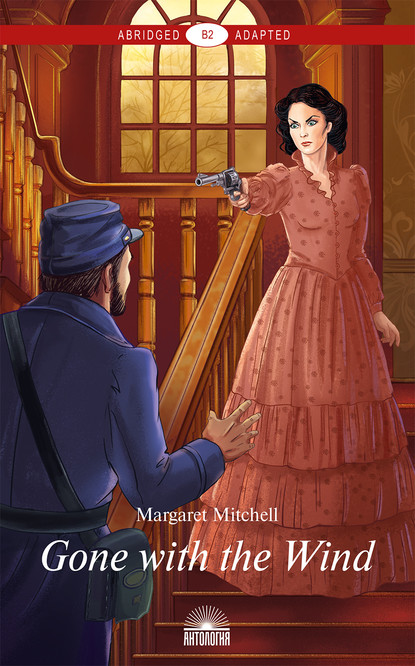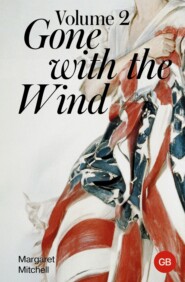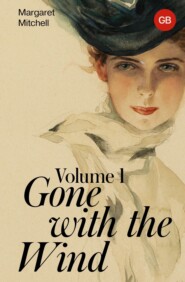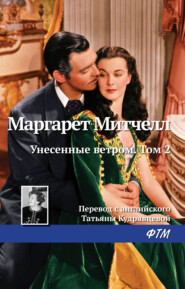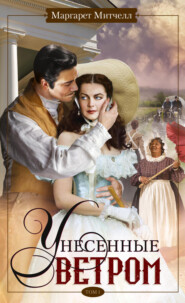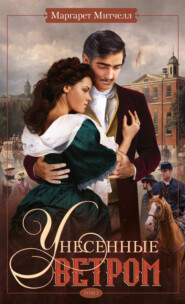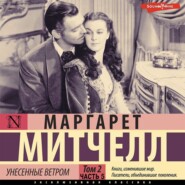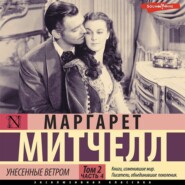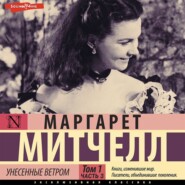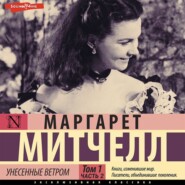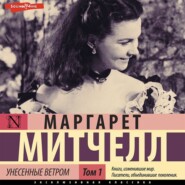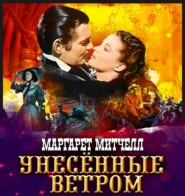По всем вопросам обращайтесь на: info@litportal.ru
(©) 2003-2024.
✖
Gone with the Wind / Унесённые ветром
Настройки чтения
Размер шрифта
Высота строк
Поля
Gone with the Wind / Унесённые ветром
Margaret Munnerlyn Mitchell
Abridged & Adapted
«Я подумаю обо всём этом завтра. Тогда я смогу. Ведь завтра уже будет другой день», – этот рефрен – спасательный круг, помогающий юной Скарлетт справиться с жизненными потрясениями.
«Унесённые ветром» – грандиозный роман о смене эпох. Его смысл раскрывают взаимоотношения героев, которые воплощают в себе старую и новую Америку. Маргарет Митчелл описывает ушедшее поколение американского рабовладельческого Юга и его образ жизни, уничтоженный войной, в которой гибнут мужчины, а на головы женщин сваливаются беды, одна горше другой. Новый, холодный мир встаёт на развалинах прошлого: ушла романтика, ушло чувство безопасности, пришли грубые материальные интересы, заботы о куске хлеба.
Текст сокращён и адаптирован. Уровень B2.
Margaret Mitchell
Gone with the Wind
© Шитова Л. Ф., адаптация, сокращение, словарь, 2020
© ООО «ИД «Антология», 2020
Part one
Chapter I
Scarlett O’Hara was not beautiful, but men admired her charm. In her face were the delicate features of her mother of French descent, and the heavy ones of her Irish father. But it was an attractive face, with a pointed chin. Her eyes were pale green with black lashes. Above them, her thick black brows went upward. She had magnolia-white skin – so prized by Southern women of Georgia[1 - Джорджия, штат на юго-востоке США].
Seated with Stuart and Brent Tarleton in the cool shade of the porch of Tara, her father’s plantation, that bright April afternoon of 1861, she made a pretty picture. Her new green dress matched the flat-heeled green slippers her father had recently brought her from Atlanta[2 - Атланта, столица и крупнейший город штата Джорджия]. The dress showed the seventeen-inch waist, and the basque showed breasts well matured for her sixteen years.
On either side of her, the twin brothers sat in their chairs, laughing and talking. Nineteen years old, six feet two inches tall, they were as much alike as two bolls of cotton.
Their faces were typical of country people who have spent all their lives in the open and troubled their heads very little with dull things in books. Raising good cotton, riding well, shooting straight, dancing lightly, and drinking like a gentleman were the things that mattered.
Their family had more money, more horses, more slaves than anyone else in the County, but the boys had less grammar than most of their neighbors.
They had just been expelled from the University of Georgia, the fourth university that had thrown them out in two years; and their older brothers, Tom and Boyd, had come home with them, because they refused to remain at an institution where the twins were not welcome. As for Scarlett, she had not opened a book since leaving the Fayetteville Female Academy the year before.
“I know you two don’t care about being expelled, or Tom either,” she said. “But what about Boyd? He wants to get an education. He’ll never get finished at this rate.”
“It don’t matter much,” answered Brent carelessly. “We had to come home before the term was out anyway.”
“Why?”
“The war, goose! The war’s going to start any day, and you don’t suppose any of us would stay in college with a war going on, do you?”
“You know there isn’t going to be any war,” said Scarlett, bored. “It’s all just talk. Why, Ashley Wilkes and his father told Pa just last week that our commissioners in Washington would come to – to – an – agreement with Mr. Lincoln[3 - Авраам Линкольн, президент США (1861-1865)] about the Confederacy[4 - Конфедерация южных штатов, де-факто независимое государство, существовавшее в период с 1861 по 1865 год в южной части Северной Америки]. And anyway, the Yankees are too scared of us to fight. There won’t be any war, and I’m tired of hearing about it.”
“Not going to be any war!” cried the twins indignantly.
Scarlett made a mouth of bored impatience.
“If you say ‘war’ just once more, I’ll go in the house and shut the door. I’ve never gotten so tired of any one word in my life as ‘war,’ unless it’s ‘secession.’ Pa talks war morning, noon and night, and all the gentlemen who come to see him shout about Fort Sumter[5 - Форт Самтер, штат Южная Каролина. Его взятие южанами послужило формальным предлогом для начала Гражданской войны в США (1861-1865 гг.)] and States’ Rights and Abe Lincoln and their old Troop[6 - Старая гвардия] till I get so bored I could scream! And I’m mighty glad Georgia waited till after Christmas before it seceded or it would have ruined the Christmas parties, too. If you say ‘war’ again, I’ll go in the house.”
The boys apologized for boring her. Indeed, war was men’s business, not ladies’.
Then Scarlett went back with interest to their immediate situation.
“What did your mother say about you two being expelled again?”
The boys looked uncomfortable. “Well,” said Stuart, “she hasn’t had a chance to say anything yet. Tom and us left home early this morning before she got up.”
“Do you suppose she’ll hit Boyd?” Scarlett, like the rest of the County, could never get used to the way small Mrs. Tarleton bullied her grown sons and occasionally whipped them. Beatrice Tarleton was a busy woman, having on her hands not only a large cotton plantation, a hundred negroes and eight children, but the largest horse-breeding farm in the state as well. She was hot-tempered, and while no one was permitted to whip a horse or a slave, she felt that a lick now and then didn’t do the boys any harm.
“Of course she won’t hit Boyd. Ma ought to stop licking us! We’re nineteen and Tom’s twenty-one, and she acts like we’re six years old.”
“Will your mother ride her new horse to the Wilkes barbecue tomorrow?”
“She wants to, but Pa says he’s too dangerous. And, anyway, the girls won’t let her. They want to see her going to one party at least like a lady, riding in the carriage.”
“I hope it doesn’t rain tomorrow,” said Scarlett. “There’s nothing worse than a barbecue turned into an indoor picnic.”
“Oh, it’ll be clear tomorrow,” said Stuart. “Look at that sunset. I never saw one redder. You can always tell weather by sunsets.”
They looked out across the endless acres of Gerald O’Hara’s newly plowed cotton fields toward the red horizon. Spring had come early that year. Already the plowing was nearly finished and the moist hungry earth was waiting for the cotton seeds.
To the ears of the three on the porch came the sounds of negro voices, as the field hands and mules came in from the fields. Scarlett’s mother, Ellen O’Hara, went toward the smokehouse where she would ration out the food to the home-coming hands. There was the click of china and the rattle of silver as Pork, the valet-butler of Tara, laid the table for supper.
The twins realized it was time they were starting home.
“Look, Scarlett. About tomorrow,” said Brent. “You haven’t promised all dances, have you?”
“Well, I have! How did I know you all would be home?
I couldn’t risk being a wallflower just waiting on you two.”
“You a wallflower!” The boys laughed.
“Now, come on, promise us all the waltzes and the supper,” grinned Brent.
“If you’ll promise, we’ll tell you a secret,” said Stuart.
“What?” cried Scarlett, alert as a child at the word.
“Is it what we heard yesterday in Atlanta, Stu? If it is, you know we promised not to tell.”
“Well, Miss Pitty told us.”
“Miss Who?”
“You know, Ashley Wilkes’ cousin who lives in Atlanta, Miss Pittypat Hamilton – Charles and Melanie Hamilton’s aunt.”
“I do, and a sillier old lady I never met in all my life.”
Margaret Munnerlyn Mitchell
Abridged & Adapted
«Я подумаю обо всём этом завтра. Тогда я смогу. Ведь завтра уже будет другой день», – этот рефрен – спасательный круг, помогающий юной Скарлетт справиться с жизненными потрясениями.
«Унесённые ветром» – грандиозный роман о смене эпох. Его смысл раскрывают взаимоотношения героев, которые воплощают в себе старую и новую Америку. Маргарет Митчелл описывает ушедшее поколение американского рабовладельческого Юга и его образ жизни, уничтоженный войной, в которой гибнут мужчины, а на головы женщин сваливаются беды, одна горше другой. Новый, холодный мир встаёт на развалинах прошлого: ушла романтика, ушло чувство безопасности, пришли грубые материальные интересы, заботы о куске хлеба.
Текст сокращён и адаптирован. Уровень B2.
Margaret Mitchell
Gone with the Wind
© Шитова Л. Ф., адаптация, сокращение, словарь, 2020
© ООО «ИД «Антология», 2020
Part one
Chapter I
Scarlett O’Hara was not beautiful, but men admired her charm. In her face were the delicate features of her mother of French descent, and the heavy ones of her Irish father. But it was an attractive face, with a pointed chin. Her eyes were pale green with black lashes. Above them, her thick black brows went upward. She had magnolia-white skin – so prized by Southern women of Georgia[1 - Джорджия, штат на юго-востоке США].
Seated with Stuart and Brent Tarleton in the cool shade of the porch of Tara, her father’s plantation, that bright April afternoon of 1861, she made a pretty picture. Her new green dress matched the flat-heeled green slippers her father had recently brought her from Atlanta[2 - Атланта, столица и крупнейший город штата Джорджия]. The dress showed the seventeen-inch waist, and the basque showed breasts well matured for her sixteen years.
On either side of her, the twin brothers sat in their chairs, laughing and talking. Nineteen years old, six feet two inches tall, they were as much alike as two bolls of cotton.
Their faces were typical of country people who have spent all their lives in the open and troubled their heads very little with dull things in books. Raising good cotton, riding well, shooting straight, dancing lightly, and drinking like a gentleman were the things that mattered.
Their family had more money, more horses, more slaves than anyone else in the County, but the boys had less grammar than most of their neighbors.
They had just been expelled from the University of Georgia, the fourth university that had thrown them out in two years; and their older brothers, Tom and Boyd, had come home with them, because they refused to remain at an institution where the twins were not welcome. As for Scarlett, she had not opened a book since leaving the Fayetteville Female Academy the year before.
“I know you two don’t care about being expelled, or Tom either,” she said. “But what about Boyd? He wants to get an education. He’ll never get finished at this rate.”
“It don’t matter much,” answered Brent carelessly. “We had to come home before the term was out anyway.”
“Why?”
“The war, goose! The war’s going to start any day, and you don’t suppose any of us would stay in college with a war going on, do you?”
“You know there isn’t going to be any war,” said Scarlett, bored. “It’s all just talk. Why, Ashley Wilkes and his father told Pa just last week that our commissioners in Washington would come to – to – an – agreement with Mr. Lincoln[3 - Авраам Линкольн, президент США (1861-1865)] about the Confederacy[4 - Конфедерация южных штатов, де-факто независимое государство, существовавшее в период с 1861 по 1865 год в южной части Северной Америки]. And anyway, the Yankees are too scared of us to fight. There won’t be any war, and I’m tired of hearing about it.”
“Not going to be any war!” cried the twins indignantly.
Scarlett made a mouth of bored impatience.
“If you say ‘war’ just once more, I’ll go in the house and shut the door. I’ve never gotten so tired of any one word in my life as ‘war,’ unless it’s ‘secession.’ Pa talks war morning, noon and night, and all the gentlemen who come to see him shout about Fort Sumter[5 - Форт Самтер, штат Южная Каролина. Его взятие южанами послужило формальным предлогом для начала Гражданской войны в США (1861-1865 гг.)] and States’ Rights and Abe Lincoln and their old Troop[6 - Старая гвардия] till I get so bored I could scream! And I’m mighty glad Georgia waited till after Christmas before it seceded or it would have ruined the Christmas parties, too. If you say ‘war’ again, I’ll go in the house.”
The boys apologized for boring her. Indeed, war was men’s business, not ladies’.
Then Scarlett went back with interest to their immediate situation.
“What did your mother say about you two being expelled again?”
The boys looked uncomfortable. “Well,” said Stuart, “she hasn’t had a chance to say anything yet. Tom and us left home early this morning before she got up.”
“Do you suppose she’ll hit Boyd?” Scarlett, like the rest of the County, could never get used to the way small Mrs. Tarleton bullied her grown sons and occasionally whipped them. Beatrice Tarleton was a busy woman, having on her hands not only a large cotton plantation, a hundred negroes and eight children, but the largest horse-breeding farm in the state as well. She was hot-tempered, and while no one was permitted to whip a horse or a slave, she felt that a lick now and then didn’t do the boys any harm.
“Of course she won’t hit Boyd. Ma ought to stop licking us! We’re nineteen and Tom’s twenty-one, and she acts like we’re six years old.”
“Will your mother ride her new horse to the Wilkes barbecue tomorrow?”
“She wants to, but Pa says he’s too dangerous. And, anyway, the girls won’t let her. They want to see her going to one party at least like a lady, riding in the carriage.”
“I hope it doesn’t rain tomorrow,” said Scarlett. “There’s nothing worse than a barbecue turned into an indoor picnic.”
“Oh, it’ll be clear tomorrow,” said Stuart. “Look at that sunset. I never saw one redder. You can always tell weather by sunsets.”
They looked out across the endless acres of Gerald O’Hara’s newly plowed cotton fields toward the red horizon. Spring had come early that year. Already the plowing was nearly finished and the moist hungry earth was waiting for the cotton seeds.
To the ears of the three on the porch came the sounds of negro voices, as the field hands and mules came in from the fields. Scarlett’s mother, Ellen O’Hara, went toward the smokehouse where she would ration out the food to the home-coming hands. There was the click of china and the rattle of silver as Pork, the valet-butler of Tara, laid the table for supper.
The twins realized it was time they were starting home.
“Look, Scarlett. About tomorrow,” said Brent. “You haven’t promised all dances, have you?”
“Well, I have! How did I know you all would be home?
I couldn’t risk being a wallflower just waiting on you two.”
“You a wallflower!” The boys laughed.
“Now, come on, promise us all the waltzes and the supper,” grinned Brent.
“If you’ll promise, we’ll tell you a secret,” said Stuart.
“What?” cried Scarlett, alert as a child at the word.
“Is it what we heard yesterday in Atlanta, Stu? If it is, you know we promised not to tell.”
“Well, Miss Pitty told us.”
“Miss Who?”
“You know, Ashley Wilkes’ cousin who lives in Atlanta, Miss Pittypat Hamilton – Charles and Melanie Hamilton’s aunt.”
“I do, and a sillier old lady I never met in all my life.”





